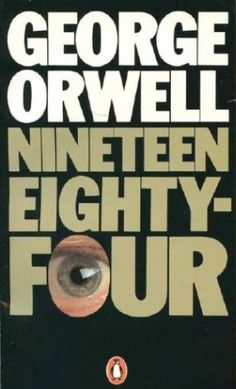
At the dawn of the 21st century, a minor literary controversy brewed over an academic work, sparked by a British poll claiming that J.R.R. Tolkien’s Lord of the Rings trilogy was “the Book of the Century.” Meaning, of course, the previous century, which has produced an impressive array of books that might also lay claim to that title.
All of this is, of course, subjective. There are many metrics for determining the greatest literary work of an entire century, some aesthetic, some philosophical, some historical and still others sociopolitical. And, while I am an avowed admirer of Tolkien’s seminal work, I recall reflecting at the time that another, perhaps more deserving candidate for Book of the Century was George Orwell’s Nineteen Eighty-Four.
Yes, my orientation is definitely sociopolitical.
No other work, in that 100-year span, more aptly describes what was the 20th century’s most fearsome sociopolitical innovation: The yoking of authoritarian power structures to modern and postmodern systems of thought. Both the Nazi and Soviet regimes gave us reigns of terror to which were added systems of thought, designed through perversions of philosophy and science, and for the first time amplified with technology, meant to pervade every area of human existence.
The 20th century, for Western civilization, was defined by the struggle against totalitarianism: Authoritarian rule yoked to ideology. And Orwell, with his bleak description of a surveillance state, a ubiquitous secret police and a comprehensive attempt to redefine reality itself through radical relativism, captured the nature of a totalitarian state better than any other work of that century.
The novel is most often used in the context of the struggle against socialism of the Soviet variety. Indeed, a neo-Nazi I once debated online pointed out that Big Brother is “a dead ringer for Stalin,” and more recently the left-wing phenomenon of political correctness is derided as an Orwellian system.
But Orwell's work is not the sole province of the right. Indeed, we now find ourselves in an era that gives the Orwellian critique of totalitarian thought systems increased and urgent relevance – in defence not of leftist or rightist ideologies, but of the entire democratic foundation of Western civilization.
In the era of U.S. President Donald Trump, with its “alternative facts” and its all-out war on the very existence of a shared sense of reality, it is time to dust off Orwell’s epoch-defining work and treat it as the novel of our new century.
There are many echoes of Nineteen Eighty-Four in this new reality south of our border, which threatens, if left unchecked, to become reality across much of the Western world. I could write an entire blog entry on the Two Minutes Hate.
But of greatest urgency in this moment is the concept of “doublethink,” the capacity to hold two contradictory beliefs in one’s mind and consider both equally valid.
At the ground level of the American president’s base of supporters, this tendency is already fully internalized. How else to reconcile, for instance, the existence of Trump tweets comparing the behaviour of his country’s intelligence agencies to that of Nazi Germany, and his subsequent statement that his feud with the intelligence community was concocted by the media? To the Trump supporter, the only recourses are wilful blindness to the existence of the former to believe the latter, or an ardent belief in both, with either brought to the fore at the supreme leader’s convenience and command.
Of greater concern, however, is the evidence, in the early days of the Trump presidency, of the administration’s attempt to extend the dominion of doublethink beyond the confines of Trump's base.
This was evident in Sean Spicer’s brazenly false claim about the crowds at the president’s inauguration. What is particularly Orwellian about this initial press conference is the shot across the bow it represents: A warning to the media that, in this age of alternative facts, it is possible to put out a shameless lie and have it internalized by the masses as truth, despite the media's most diligent efforts. Trump's subsequent doubling down on claims about millions of illegal voters in last November's election suggests this tactic is not going away.
The novel addresses this rage to redefine truth in chilling passages such as the one above, and sometimes in more mundane moments that eerily echo the malleability this Trumpian regime demands.
(“It appeared that there had even been demonstrations to thank Big Brother for raising the chocolate ration to twenty grammes a week,” Winston reflects early in Nineteen Eighty-Four.
“And only yesterday, he reflected, it had been announced that the ration was to be reduced to twenty grammes a week. Was it possible that they could swallow that, after only twenty-four hours? Yes, they swallowed it.”)
Thankfully, we are not yet living in Orwell's universe. The population of the United States, and the wary peoples of the other democratic nations, have not yet fully swallowed these new structures of thought. If Trump's opponents like to call themselves The Resistance, then these modes of thought are the first form of oppression to be resisted.
Journalists, despite their diminished numbers and the economic uncertainty hanging over them like the Sword of Damocles, must rise to Spicer's challenge and fight for the common truths that should define a healthy democratic society. (This includes, as Michiko Kakutani aptly observes here, insisting on clear and precise language.)
All of us must help them by insisting, despite the pressures of authority, that two and two are four.
And educators can do much to assist them by making Nineteen Eighty-Four, the novel of a new century, required reading – before the book is dropped down the memory hole.